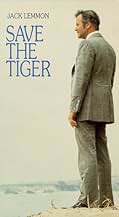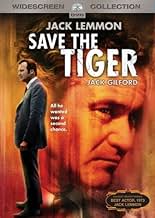Troubled garment manufacturer Harry Stoner tries to make his small debt-ridden factory survive, hires an arsonist to burn down a building so Harry can collect the insurance money, he pimps f... Read allTroubled garment manufacturer Harry Stoner tries to make his small debt-ridden factory survive, hires an arsonist to burn down a building so Harry can collect the insurance money, he pimps for clients, and has flashbacks to the war.Troubled garment manufacturer Harry Stoner tries to make his small debt-ridden factory survive, hires an arsonist to burn down a building so Harry can collect the insurance money, he pimps for clients, and has flashbacks to the war.
- Won 1 Oscar
- 2 wins & 5 nominations total
- Ula
- (as Liv Von Linden)
- Tiger Petitioner
- (as Biff Elliott)
- Model
- (uncredited)
- Director
- Writer
- All cast & crew
- Production, box office & more at IMDbPro
Featured reviews
The film almost has a low budget, made-for-television feel and look. But it still delivers an engrossing story of people under stress.
I believe the strength of this film is that his performance allows it to strike a multi-generational cord with viewers...a key theme of the movie is the way the world has changed since they way we remembered it when we were younger, which I think is a pang that all of us get, no matter what age. The world always seems darker and more complicated now and concept that needs no real transposition between eras.
Harry Stoner is a man of his times...swing bands, baseball, and World War II. His life is still influenced by all three, but only in quick flashes of fond memories or flashbacks of a beach in Italy. Lemmon gives us a character that does what he has to do in order to maintain what he has worked for, and that rationalizes that which may or may not be quite on the up-and-up.
Jack Gilford is excellent as his partner in Capri Casuals, representing a voice of conscience that is not quite as blind to circumstance as Jack's character, and there are several other good performances in the film. Jack Lemmon stands out, as he does in most films, and richly deserved the Academy Award for this one.
Little did I know, that thirty years later, I would be going through one of my own and would once again be drawn to, and struck by, the sincerity and integrity of Jack Lemmon's performance.
The film has it's critics, self indulgent, sentimental and simplistic are only some of comments made, but the film still has the power to make you question what you have done with your own life. It asks you how you got to where you are, and it makes you ask yourself if it was all worth it. It also questions/exposes the Great American Dream and asks, if that is not the be all and end all, then what is?
Harry Stoner is not a man you should feel sorry for, but Lemmon's interpretation forces you to question his ideals and your own, as you follow this crisis point in his life. In the end, whether you like the film or not, or agree with what it is trying to say, you can't deny Lemmon his Academy Award.
Jack Lemmon delivers a brilliant, Oscar-winning performance as Harry Stoner, a middle-aged man at the end of his tether, who confuses his personal midlife crisis, and the failure of his fashion business, with what he sees as the USA's moral decline in the post-war years. Obsessed with the lost cameraderie of his active service in the war, with the baseball and jazz giants of yesteryear, and with the slain and fallen idols of the 60s (Kennedy, King, Monroe etc), he sleepwalks into his own moral abyss of an arson plot, comforting himself that he is no worse than the times in which he lives.
Lemmon's character is countered by those of Phil Greene, his business partner, convincingly played by Jack Gilford, and Meyer (William Hansen), the firm's veteran, expert cutter and refugee from Nazism. Phil does not suffer Harry's sense of disillusion, because he is too down-to- earth to have experienced the illusion in the first place; Meyer, also, despite superficial discontent with the changing times, gains strength from his skill and family life.
For me, the main theme here is the familiar one of the lost American Dream, and the film brings to mind the final lines of the seminal exploration of that theme, the Great Gatsby - "So we beat on, boats against the current, borne back ceaselessly into the past." Harry's American Dream is not of a golden future, but of a golden past; it isn't lost, it simply never existed. But, that said, in this movie thematic analysis definitely takes second place to appreciation of Lemmon's bravura performance.
really did have the everyman down to a science. The movie is an excellent
commentary on dreams coming apart, the loss of old friends, and realizing
youre time may have come and gone. Not exactly the most uplifting movie but it is raw and honest. Lemmon and his partner run Capri Casuals, a women's wear
line based in southern California in the early 70's. (incidentally the name comes from the island where most of Lemmons war time buddies were killed and
buried) When times get tough and Lemmon is lowering himself by becoming a
pimp to a big customer, he realizes his American dream might be over. In
consultation with his partner he decides to hire an arsonist to destroy his factory for the insurance. An intense, searing performance from Lemmon, makes Save
the Tiger a movie that should be watched for years to come.
Highly Recommended.
Storyline
Did you know
- TriviaActor Jack Lemmon waived his usual fee and worked for scale plus a percentage of the gross. Scale was US $165 a week at the time.
- GoofsHarry wipes Fred's face almost completely clean of the red body paint. In a subsequent shot, Fred's face is covered with red paint again.
- Quotes
Myra: Are you OK? Do you want something?
Harry Stoner: Yes. I want that girl in a Cole Porter song. I wanna see Lena Horne at the Cotton Club - hear Billie Holiday sing fine and mellow - walk in that kind of rain that never washes perfume away. I wanna be in love with something. Anything. Just the idea. A dog, a cat. Anything. Just something.
- ConnectionsFeatured in Paramount Presents (1974)
- SoundtracksAir Mail Special
Composed by Jim Mundy, Benny Goodman & Charlie Christian
- How long is Save the Tiger?Powered by Alexa
Details
- Release date
- Country of origin
- Languages
- Also known as
- Rettet den Tiger!
- Filming locations
- Production companies
- See more company credits at IMDbPro
Box office
- Budget
- $1,000,000 (estimated)
Contribute to this page


































